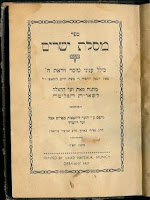 |
| Photo and layout by me If you like it then check out this |
Warning: Were I not blogging under my real name, this would have been much easier to write. I actually thought about using my nom de plume, Jack Gerouac, but I’m not really into hiding behind another name, hence the reason I blog with my own name. By the way, don’t bother looking for any posts written by “Jack Gerouac”, his blog Al Ha Derech was just me playing with WordPress over a year ago.
I am into “growth”, but ironically not into change. I don’t mind change if it’s neatly pressed and freshly startched, like remembering to turn off lights, smile and say, “Hi,” or count sefira. Those are fairly low-maintenance changes. I’m talking about the real changes, the kind you cheshbon over and make excuses why you don’t need to change. The kind you sweat over and cry into your Tehillim about. As Avi Shulman says, “Until the pain of staying the same is greater than the pain of change, we will never change.”
Go ahead and laugh. Come on! You would think that since I’m attracted to Mussar, I would be all over change like the color black on my hat. At one point, many years ago, I was. I didn’t mind changes in location, routine, or the hard work involved in tikun ha’middos. Over the years, that has changed. Think about the famous smooth rocks that Rabbi Akiva found. Yes, they changed form and became rounder after years of being exposed to flowing water. However, they also were worn down and eventually went from having clearly defined edges to being smother. We all know that the Deled in Shema is enlarged because we don’t want to confuse it with a Reish (changing echad, one, to acher, other). Rav Hirsch expands on this and says that the Daled of echad is right angled and clearly defines where two points meet and become one, such is monotheism The Reish, however, is curved where the horizontal and vertical lines come together, showing the less defined way of polytheism. Just like effort can be gradual I have seen, in myself, that the Yetzer Hora applies the same tactic of gradually changing our path of getting closer to Hashem.
I will not get into details, but since December I have been steered into choppy waters in the dynamics of relationships with others. I’ve been forced to confront lies, which ultimately distance one from Hashem. Most recently changes occurred in my employment status (and subsequently my LinkedIn status). There is also a change in my behavior that has been present for a while, but recently is being re-addressed proactively.
While most of this was playing out towards the end of February, I attended a great program and heard Rabbi Reuven Brand, Rosh Kollel of the YU Torah Mitzion Kollel recommend a book, called Mindset (to find the best price for it check out this). In the most basic way I can think of, Carol Dweck, Ph.D shows how everyone has one of two mindsets. Either it’s a “fixed” mindset or a “growth” mindset. Her website explains it like this:
In a fixed mindset, people believe their basic qualities, like their intelligence or talent, are simply fixed traits. They spend their time documenting their intelligence or talent instead of developing them. They also believe that talent alone creates success—without effort. They’re wrong.
In a growth mindset, people believe that their most basic abilities can be developed through dedication and hard work—brains and talent are just the starting point. This view creates a love of learning and a resilience that is essential for great accomplishment. Virtually all great people have had these qualities.Teaching a growth mindset creates motivation and productivity in the worlds of business, education, and sports. It enhances relationships. When you read Mindset, you’ll see how.





